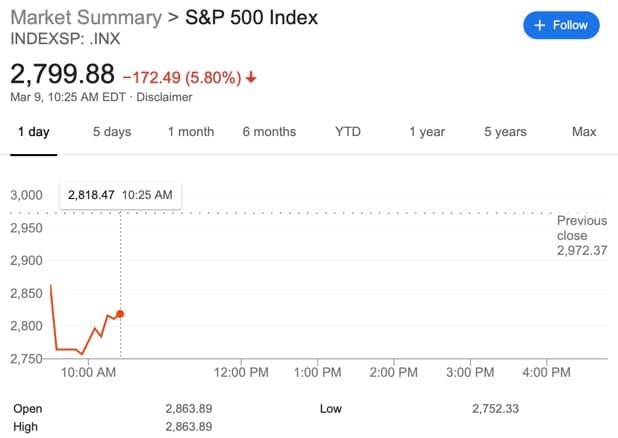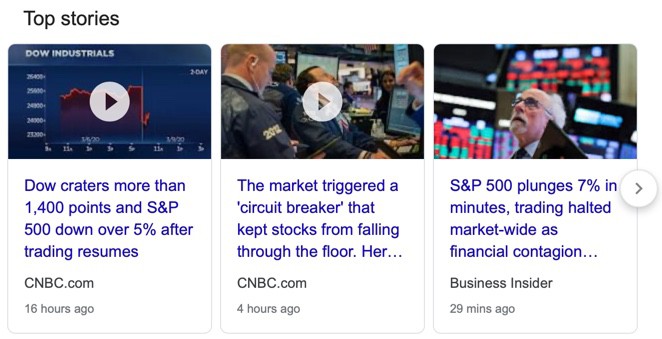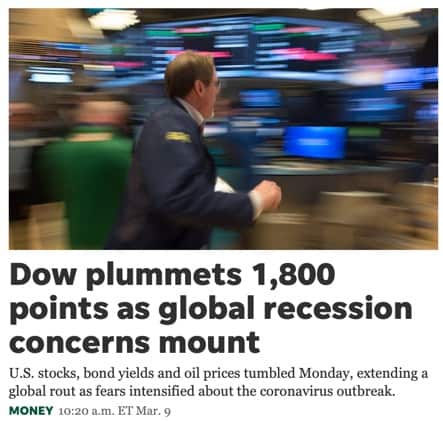Can you feel it? There’s panic in the streets! We’re in the middle of a stock exchange crash and the hysteria is beginning once again. As I compose this, the S&&P 500 is down 6 percent today — — and 17.3 %off its record high of 3386.15 on February 19th.

.
Media outlets all over are sharing worried headings.

All over the TELEVISION and web, other monetary press reporters are submitting comparable stories. And why not? This things offers. It’s the monetary equivalent of the old press reporter’s saying: “If it bleeds, it leads.”
Here’s the leading story at USA Today at this very minute:

But here’s the important things: To be successful at investing, you need to pull yourself far from the monetary news. You need to disregard it. All it’ll do is make you insane.
Note: This is an upgraded variation of the post I release whenever the stock exchange crashes. I last shared it on 21 January 2016. Some remarks are from previous variations of the piece.
Bad Behavior.
The unfortunate reality is that individuals tend to put cash into stocks throughout booming market —– after the stocks have actually been increasing for a long time. Speculators overdo, scared to lose out. They bail and worry out after throughout a stock market crash. By purchasing high and offering low, they lose a lot.
It’s typically little specific financiers like you and me who make these errors. Throughout the Great Recession, one Get Rich Slowly reader shared the following story:
” I’m in the [monetary] market…… I can inform you now that when the marketplaces tanked throughout October [2008], individuals with less than (roughly) 100k acted substantially various from financiers with 100k+ in the market. Individuals who did not have an emergency situation fund acted considerably various than those who did, normally to their own hinderance.
” These actions lead me to think that individuals with significant possessions tend to ride out the marketplace and not stress over short-term variations, whereas individuals with smaller sized quantities of properties secure losses by getting rid of properties from the marketplace at bad times. When/if they get back in, they’’ ve missed out on out on a number of days of huge gains……
” As it was occurring I was stunned by the clear earnings separation that appeared to separate reasonable habits from unreasonable habits. Do little financiers make behavioral errors that keep them from prospering?”
Instead of offering throughout a slump, it’s much better to buck the pattern. Follow the suggestions of billionaire Warren Buffett, the world’s biggest financier: “Be afraid when others are greedy, and be greedy when others are afraid.”
In his 1997 letter to Berkshire Hathaway investors , Buffett made a dazzling example: “If you prepare to consume hamburgers throughout your life and are not a livestock manufacturer, should you want greater or lower costs for beef?” You desire lower costs, obviously: If you’re going to consume great deals of hamburgers over the next 30 years, you wish to purchase them low-cost.
Buffett finishes his example by asking, “If you anticipate to be a net saver throughout the next 5 years, should you expect a greater or lower stock exchange throughout that duration?”
Even though they’re years far from retirement, a lot of financiers get thrilled when stock costs increase (and panic when they fall). Buffett explains that this is the equivalent of rejoicing due to the fact that they’re paying more for hamburgers, which does not make any sense: “Only those who will [offer] in the future ought to enjoy at seeing stocks increase.” He’s driving house the olden knowledge to purchase low and offer high.
Doing this can be hard. For something, it breaks your gut. Throughout a stock exchange crash, the last thing you wish to do is purchase more. How do you understand the market is near its peak or its bottom? The fact is you do not. The very best service is to make routine, organized financial investments —– no matter whether the marketplace is low or high.
Meanwhile, overlook the monetary news.
No News is Good News.
The mass media remains in business of offering news, and to do that, they sensationalize it. Sustained by the over-eager reporting, unreasonable liveliness can rapidly rely on prevalent gloom. Neither frame of mind makes good sense. They’re both extremes that lead financiers to make bad options.
For example, I understand a number of individuals who “invested” in Bitcoin when it was all over the news. Now they want they had not however they purchased into the buzz. My sibling lost 2 houses to foreclosure and stated insolvency since he purchased into the U.S. real estate bubble throughout the mid 2000s.
Meanwhile, individuals I understand who disregard monetary tend to succeed.
The May 2008 concern of the AAII Journal included a short article entitled ” The Stock Market and the Media: Turn It On, But Tune It Out ” in which author Dick Davis argued that everyday market motion is approximate and/or typically illogical. Other than for apparent drivers — — military coups, natural catastrophes, the coronavirus — — no one understands what makes the marketplace carry on any offered day. Short-term modifications appear random. As we simply found out from Warren Buffett, they aren’t truly appropriate if you have a long-lasting financial investment horizon (which is most likely the case for many of you).
To the long-lasting financier, day-to-day market motions are primarily sound and filler. “What’s essential is repeating or the absence of it,” Davis composes. A trendline is better than a datapoint.
” I think among the worst things that can take place to a long-lasting financier is to be quickly and absolutely notified about his stock. Area news fades into irrelevance over time…… Big market relocations might be mysterious, however a long-lasting or dollar-cost averaging method prevents the requirement for descriptions.”
You can view the everyday financial investment news, however do not let it sway your choices. “Focus on the long term,” Davis composes, “and you can overlook the media’s distortions.”
Davis isn’t the only one to think that no news is great news. Research study backs him up. In Why Smart People Make Big Money Mistakes (and How to Correct Them) , the authors mention a Harvard research study of financial investment practices. The outcomes?
” Investors who got no news carried out much better than those who got a continuous stream of info, bad or great. Amongst financiers who were trading [ an unpredictable stock], those who stayed in the dark made more than two times as much cash as those whose trades were affected by the media.”
Though it might appear careless to overlook monetary news, the book argues that it’s not: “Long-term financiers require not issue themselves with the other day’s closing cost or tomorrow’s quarterly incomes reports.” Make your choices based upon your individual monetary objectives and a pre-determined financial investment technique, not on whether the marketplace dropped or leapt the other day.
“But This Time Is Different!”.
Whenever the stock exchange crashes, there are folks who weep, “This time is various!” This time the marketplace will not recuperate. This time the economy is going to be stuck in a morass for many years. Or years. Or permanently. Far, “this time” has actually never ever been various.
But I’ll confess: This time does feel a little various. Yes, I think that much of this panic is simply that — — panic. And I anticipate that, in general, this decline will mirror previous slumps. That stated, the coronavirus is genuine. Regardless of the admonitions of specific self-proclaimed professionals , the coronavirus is not the influenza . It’s far deadlier. And even when it’s not deadly, it can be incapacitating. (Did you understand that 5% of cases in China need mouth-to-mouth resuscitation? Another 15% need oxygen treatment? That’s not the influenza.)
The coronavirus is having genuine impacts on the worldwide economy. And those impacts might remain for months —– or years.
Take Apple. Among the world’s biggest business, Apple’s revenues depend upon a routine item cycle, one that consistently presents updates to existing gizmos while sometimes presenting brand-new ones. The coronavirus is going to postpone numerous of its organized 2020 statements. Plus, it’s messing up production of existing products. The bottom line? Apple’s numbers are going to be a mess this year.
Apple isn’t alone. The coronavirus is creating chaos with the international economy — — and I believe this is simply the start.
Italy is limiting travel and canceling all public occasions. The city of Austin, Texas canceled the South by Southwest celebration. Sporting occasions worldwide have actually been impacted. Games have actually been held off or canceled. Some are being played without viewers. And even the summertime Olympics — — arranged to begin on July 24th — — remain in risk of being postponed.
Here in Portland, we’ve had the coronavirus for about 10 days now. The very first identified case originated from an individual used at a school simply 5 miles from our home. This has actually triggered stressed operate on Costco and Wal-Mart.

Yesterday, Kim and I participated in 2 congested occasions: a Broadway musical (Frozen) and a Portland Timbers soccer match. Both had light participation. (The authorities Timbers statistics reveal a max-capacity crowd of 25,218 however that’s bullshit. There were empty seats all around.)
All this is to state: The coronavirus has actually currently impacted the nationwide economy, and it’s just going to get even worse. Your finest defense? A continuous project to establish a strong individual economy.
The National Economy vs. Your Personal Economy.
Obviously, the nationwide financial scenario impacts our individual monetary choices to some degree.
When joblessness skyrockets, it’s crucial to preserve a sufficient emergency situation cost savings and to restrict your usage of financial obligation. When the stock exchange crashes, you require to comprehend your financial investment goals, and how these connect to your danger tolerance and your financial investment timeline. (And when the stock exchange is up, you require to ask the very same concerns.)
Regardless the state of the nationwide economy, eventually you are accountable for your individual economy. A cash employer is proactive , getting ready for issues prior to they happen. You require to set something aside for the future when times are flush. When things turn miserable and dark, you’ll be much better protected from the slings and arrows of outrageous fortune.
A strong individual economy is constructed on personal-finance basics such as these:
Clear monetary objectives. You require to understand why you’re conserving and making cash . Where do you wish to remain in 5 years? 10? How do you wish to arrive?An appropriate emergency situation fund. Specialists disagree on how huge an emergency situation fund need to be. Some state 6 months, some state twelve, and others state 3. When the economy gets rocky, I state it ought to be big enough to let you sleep at night. (And the very best time to conserve is prior to you require the cash.).Minimal usage of financial obligation. Utilize it sensibly if you utilize financial obligation. A home mortgage isn’t a bad thing, and neither are trainee loans. An auto loan is borderline, however, and obtaining to purchase a tv is absurd. When required, utilize financial obligation just. If you think you might lose your task or come across some other huge life modification, then eliminate financial obligation entirely.The practice of thrift. When your individual economy is great, it’s simple to get lulled into complacency. You begin purchasing natural catsup and consuming in elegant dining establishments. You take larger getaways. If you can master the art of thriftiness when times are fat, you’ll be much better able to practice it when times are lean.Smart investing for the future. Invest carefully. Do not let the news lead you to make psychological choices. Purchase low and offer high. If you weren’t going to offer your financial investments when the Dow was near 30,000, then how worldwide does it make good sense to offer them when the Dow is near 25,000?
The structure of a strong individual economy is education. To end up being a smart financier, you should be an informed financier. And you should acknowledge what you can and can not manage. The nationwide (and worldwide) economy impacts your individual economy, however eventually all you can manage are your individual financial resources.
I’m extremely keen on this example, so I’ll share it once again: The nationwide economy resembles a river. In some cases the water is still and deep. Often the present is swift. In some cases rapids and snags obstruct the river. Your individual economy resembles a boat on that river. Your objective is to reach the river’s mouth, and to do so you need to keep the boat in working order. You need to prevent the rapids and snags, which implies advance preparation. Primarily, your journey down the river is enjoyable. From time to time, however, things can get hairy. If you’re not cautious, in truth, your boat can capsize. Through all of it, the river streams in one instructions —– and daily, well-prepared sailors reach their locations.
The Bottom Line.
I understand market recessions can be frightening. Here’s the thing: If this volatility makes you anxious, if it triggers you to make bad choices, then perhaps you’ve put too much cash into the stock market. Volatility is among the basic functions of stocks.
On average, the stock exchange returns 10% annually (around 7% when changed for inflation). Average is not typical.
Recent history is normal. The following table reveals the yearly return for the S&P 500 over the previous twenty years (not consisting of dividends):

The S&P 500 made a typical annualized return of 6.06% for the twenty-year duration ending in 2019. Absolutely no of these years created stock market returns close to the average for that time period. (2007 came closest to typical with a return of 3.53% — — still more than 2.50% off the average.)
Short-term market motions aren’’ t a precise sign of long-lasting efficiency. What a stock or fund did in 2015 doesn’’ t inform you much about what it ’ ll do throughout the next years.
In Benjamin Graham’s timeless The Intelligent Investor , he composes:
” The financier with a portfolio of sound stocks ought to anticipate their rates to vary and need to neither be worried by substantial decreases nor end up being delighted by large advances. He ought to constantly keep in mind that market quotes are there for his benefit, either to be made the most of or to be neglected. Since it has actually gone up or offer one since it has actually gone down, he needs to never ever purchase a stock. He would not be far incorrect if this slogan found out more merely: “Never purchase a stock instantly after a considerable increase or offer one instantly after a considerable drop.”
If you think stock rates are still high, then avoid the marketplace. Purchase if you believe they’re low. And keep in mind: Unless you offer your stocks, you have not lost anything at this moment —– it’s all on paper.
During the tech bubble of the late 1990s, I became part of a financial investment club. My good friends and I chortled with glee as we purchased tech stocks ( Celera Genomics , Home Grocer , Triquint Semiconductor ) near the top of the marketplace. We believed we were going to be abundant. When the bubble popped; we closed the club and offered the stocks at big losses, we weren’t chuckling so hard. What lesson did I find out? The time to purchase is when rates are low, not when they’re high.
I think that for the typical long-lasting financier, the very best strategy today is to make routine scheduled purchases of low-priced varied index funds.
That’s what I’ve carried out in the past. That’s what I ‘d be doing today if I had cash to invest.
Further reading: Eight years earlier, my friend J.L. Collins composed a terrific short article about market crashes and how to manage them . Jeremy from Go Curry Cracker has actually blogged about direct exposure treatment , about how consistently “losing” $100,000 (or more) in the stock exchange has actually desensitized him to the experience. And Mrs. Frugalwoods has a fantastic artricle about the zen art of losing cash .
.
Original Source: getrichslowly.org
Curated On: https://www.cashadvancepaydayloansonline.com/
The post Love in the time of coronavirus (or – What to do when the stock market crashes) appeared first on Instant Advance Payday Loans Online | Cash Advance Payday Loans Online.
source https://www.cashadvancepaydayloansonline.com/love-in-the-time-of-coronavirus-or-what-to-do-when-the-stock-market-crashes/?utm_source=rss&utm_medium=rss&utm_campaign=love-in-the-time-of-coronavirus-or-what-to-do-when-the-stock-market-crashes
No comments:
Post a Comment